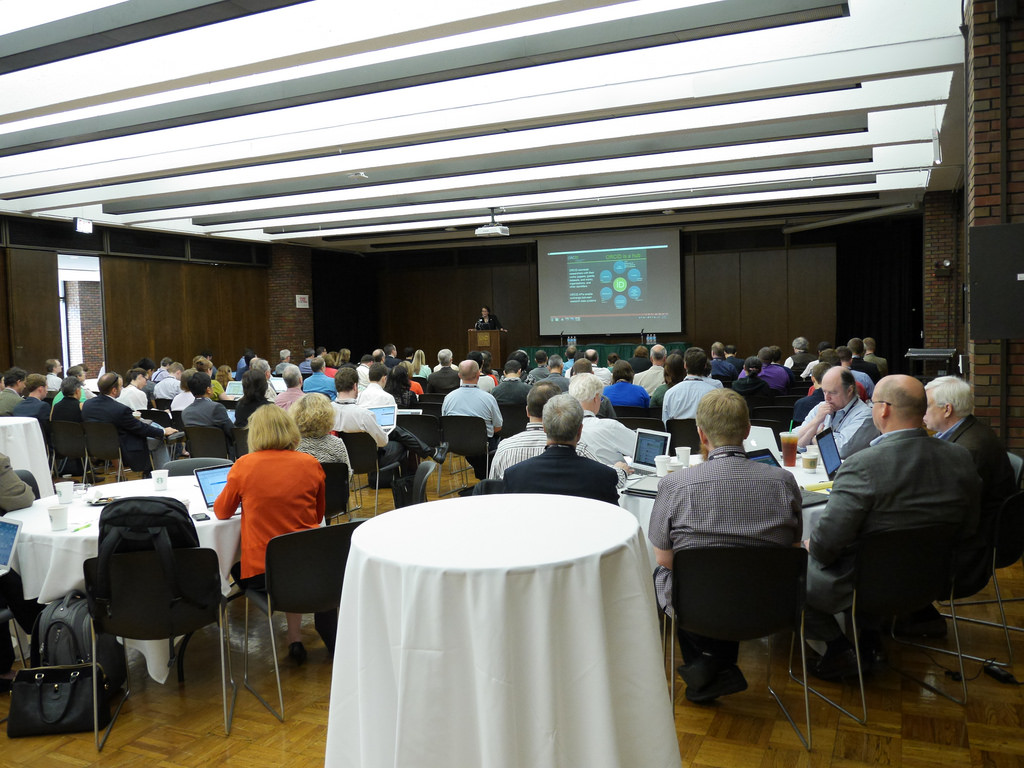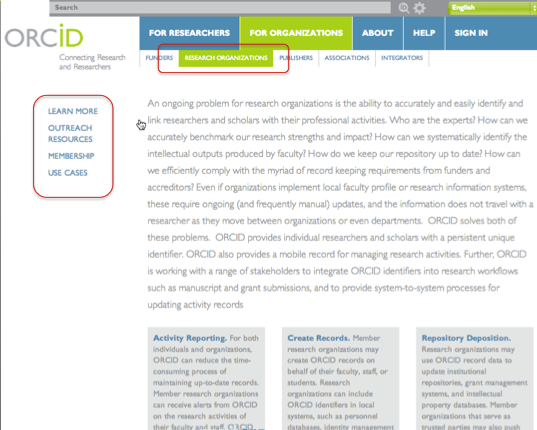On May 21-22, 2014 ORCID held its twelfth bi-annual Outreach Meeting, hosted by the University of Illinois in Chicago. About 160 individuals from around the world participated. Slides and webinar recordings and posters from the event are now available online. This outreach meeting showcased the integrations, use cases, and outreach efforts at universities and professional societies, including nine Adoption and Integration partner institutions that were supported by a grant to ORCID from the Alfred P. Sloan Foundation. The variety and depth of integration work being carried out by the community was impressive, demonstrating significant progress implementing ORCID identifiers across campus systems. Nearly 60 universities are now ORCID members!
Joshua Greenberg, Sloan Foundation Director of Digital Resources, said in his opening remarks that ORCID iDs are central to the integrity of the scholarly record, particularly as new forms of scholarship evolve. Barbara Allen of the CIC highlighted the promise of ORCID as a durable persistent ID for enabling the discoverability of lifelong research contributions. Karen Butler-Purry of Texas A&M echoed this in her comments, commenting on the role of ORCID in relation to understanding student success. Neil Jacobs provided an overview of the Jisc consultation on ORCID, which is culminating in an ORCID Pilot project in the UK, and re-stated one of the early findings of the Jisc task group, that “ORCID should be a cathedral and not a bazaar: focus on providing a registry of persistent researcher identifiers and do that very well.” And Yan Shuai of Tsinghau University spoke to the need for name disambiguation in the Chinese researcher community, and summarized the challenges of embedding ORCID into research culture and systems.
More than a dozen institutions, among them Purdue University, Chalmers University of Technology, and the University of Michigan demonstrated how they were how they were integrating ORCID into their systems including:
- Institutional and data repositories including DSpace, HubZero, and Hydra/Fedora.
- Research information and CRIS systems—both open source and proprietary, including Converis, Pure, Profiles, Symplectic, and VIVO.
- Thesis and dissertation submission and deposit for graduate students, using Vireo and DSpace platforms.
- Publications, meetings, and membership renewal at large professional associations, such as Society for Neuroscience and IEEE
- Institutional LDAP directories and facilitating access to repositories such as ICPSR.
- The creation of ORCID identifiers for faculty and graduate students and supporting outreach activities
Technical resources
Participants spoke about the technical aspects of their projects. Michael Witt from Purdue University remarked that using the ORCID API was “straightforward, well-documented and well-supported.” ORCID provides a comprehensive Knowledge Base of documentation, and an open developer’s sandbox to help support integration and innovation. Support for ORCID has been integrated into the source code of many research information platforms, making adoption even easier for organizations.
The ORCID Technical Team also held a Codefest simultaneous to the Outreach Meeting. Codefest projects and project winners will be highlighted in an upcoming blog.
Outreach resources support institutions and researchers
Most attendees agreed that the challenges of working within large, decentralized organizations, building consensus, considering policies, and educating scholars and researchers about ORCID were the most formidable challenges. Organizational cultures vary, and it was great to hear about different approaches: from the “light touch” at University of Oxford, the facilited record creation by Chalmers, to the creation of more than 10,000 ORCID identifiers for all graduate students at Texas A&M University. In addition, Keith Hazelton of the University of Wisconsin and Internet2, stressed the importance of involving the identity and access management team during the ORCID planning process at universities, stating that “the cross-coordination effort brings challenges, but the long-run benefits make it worth it.” In all cases, universities reported that it was essential to build consensus across the institution, securing support from units such as the library, office of the CIO, research office, graduate school, and registrar.
In addition to the excellent technical documentation already available, we also have a growing number of resources to support universities/research organizations, professional societies, publishers, and funding agencies.
- Preliminary use cases from the Sloan-funded Adoption and Integration program are now available online so that you can learn more about how other institutions are using ORCID.
- Links to relevant blogs and presentations.
- An online Planning Guide for Institutions Creating ORCID Records
- We also have an ever-growing toolkit of online resources—slide decks, handouts, newsletter text, and more, in multiple languages—that organizations can adapt for education and outreach at their own institutions.
- And of course, the slides, videos, and posters are available from this outreach meeting.
Join the ORCID community
ORCID is fundamentally a community-driven effort. Join us in using and promoting ORCID identifiers at your organization. You can start today by signing up for your own ORCID iD, linking to your organization and existing works, and adding it to your email signature, web page, and more. Word of mouth is the most powerful way to share information about ORCID, and we appreciate the advocacy of every member of our community.
Save the date! Our next Outreach Meeting will be held in Tokyo on November 4 at the National Institute of Informatics (NII). Read our blog and follow us at @ORCID_Org for more details.
Thanks to ORCID Ambassador Keita Bando for the photograph used in this blog.
.png)


